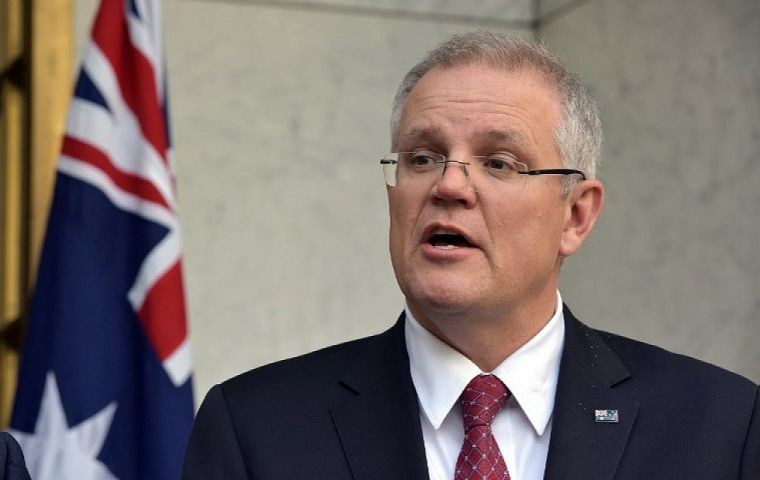MercoPress. South Atlantic News Agency
Australia will recognize West Jerusalem as Israel's capital, but won't move from Tel Aviv until a peace deal
 “Australia now recognizes West Jerusalem, being the seat of the Knesset and many of the institutions of government, is the capital of Israel” said PM Scott Morrison
“Australia now recognizes West Jerusalem, being the seat of the Knesset and many of the institutions of government, is the capital of Israel” said PM Scott Morrison Australian Prime Minister Scott Morrison has confirmed that his government will recognize West Jerusalem as the capital of Israel. However, he said Australia's embassy would not move from Tel Aviv, until a peace settlement was achieved. He added Australia also recognized the aspirations of the Palestinians to a state with a capital in East Jerusalem.
The status of Jerusalem is one of the most contested issues between Israel and the Palestinians.
US president Donald Trump drew international criticism last year when he reversed decades of US foreign policy by recognizing the ancient city as Israel's capital. The US embassy was relocated from Tel Aviv to Jerusalem in May.
Mr Morrison's announcement comes after a period of consultation with politicians in Australia and allies abroad.
“Australia now recognizes West Jerusalem, being the seat of the Knesset and many of the institutions of government, is the capital of Israel,” said Mr Morrison, speaking in Sydney on Saturday.
“We look forward to moving our embassy to West Jerusalem when practical ... and after final status determination.”
When the policy review was announced in October, it drew support from Israel, but criticism from the Palestinian side. Mr. Morrison's predecessor, Malcolm Turnbull, had ruled out following the US in moving Australia's embassy to Jerusalem.
Two other countries - Guatemala and Paraguay - have announced they would also make the switch, but Paraguay later reversed the decision after a change of government.
The status of Jerusalem goes to the heart of the Israeli-Palestinian conflict.
Israel regards Jerusalem as its “eternal and undivided” capital, while the Palestinians claim East Jerusalem - occupied by Israel in the 1967 Middle East war - as the capital of a future state.
Israeli sovereignty over Jerusalem has never been recognized internationally, and according to the 1993 Israel-Palestinian peace accords, the final status of Jerusalem is meant to be discussed in the latter stages of peace talks.
Since 1967, Israel has built a dozen settlements, home to about 200,000 Jews, in East Jerusalem. These are considered illegal under international law, though Israel disputes this.
In December 2017, UN member states voted decisively at the General Assembly in favor of a resolution effectively declaring US recognition of Jerusalem as Israel's capital to be “null and void” and demanding it be cancelled.




Top Comments
Disclaimer & comment rules-

-

-

Read all comments“...but won't move from Tel Aviv until a peace deal”
Dec 15th, 2018 - 03:42 pm 0In other words, not for at least the next 50 years...
lol. Funny. A couple things at work. Poor oz is still just a proxy for the UK. Must be a residual condition from the inmate colony/Stockholm syndrome thing.
Dec 16th, 2018 - 04:03 pm 0UK may ultimately become a muslim nation.
UK is still butthurt about the manner in which they left Israel.
REF: “Australia will recognize West Jerusalem as Israel's capital, but won't move from Tel Aviv until a peace deal”:
Dec 18th, 2018 - 10:26 am 0Keep EVERYONE happy - a cleaver [!] strategy!
Commenting for this story is now closed.
If you have a Facebook account, become a fan and comment on our Facebook Page!